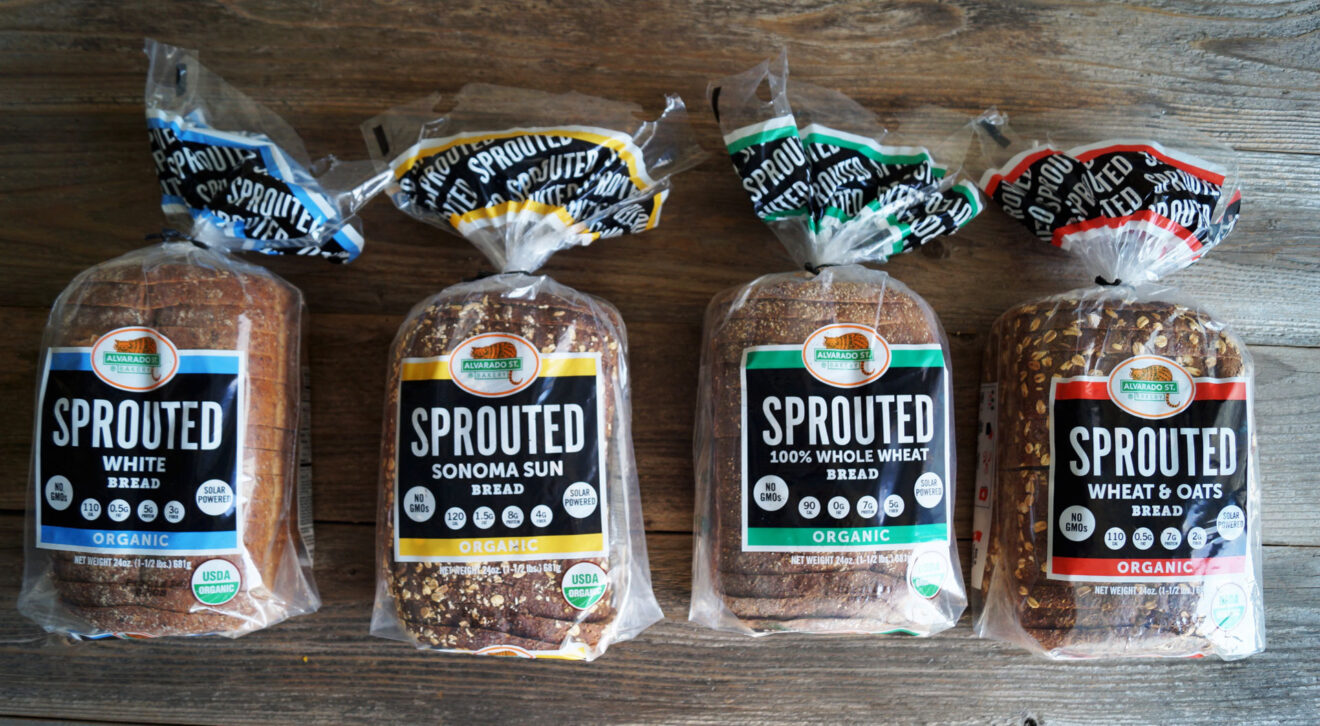This post is sponsored by Alvarado Street Bakery.
Breads and other bakery products made with sprouted grains offer a range of health benefits, but not all sprouted grain products are created equal. We interviewed Michael Girkout, director of marketing for Alvarado Street Bakery, about the process the California-based company uses to ensure its breads offer the full digestibility and nutrient-rich benefits of sprouted grains.
Much like the term “natural”, there is no regulation of the term “sprouted.” How do different brands use the term differently, and how can this create confusion in the marketplace?
While the term “sprouted” is appearing on more and more packages from baked goods to snacks, there remains some confusion as to what that actually means. Since there is no regulation or clear definition, there are quite a few different uses of the term. Some manufacturers are baking traditional flour-based breads and tossing a handful of sprouts in the dough and calling it “sprouted.” Some are using frozen sprouts to add to doughs, and there’s even “sprouted flour” — which is really just soaked grains that are then dried and eventually milled into a flour.
What makes Alvarado’s Seriously Sprouted products different than products that use sprouted grain flour?
Our method is really quite different. We harvest fresh sprouts every day and we grind these living, breathing plants into the dough we use to bake our sprouted breads. Grains that are seriously sprouted — a process that can take up to four days — and then harvested at the peak of enzyme activity are more nutritious and more easily digested. If you recall from our school days, if you mix water with flour you get paste. This is a difficult thing for the body to digest, and much of the nutrient value passes right through you. The sprouting process transforms the whole grain from a hard, dormant seed to a living, breathing plant, and it’s so much easier for the body to digest plant-matter than something made with processed flour.
What are the health benefits of consuming breads and other bakery products made with true sprouted grains?
The benefits are actually twofold. First, the digestibility of sprouts vs. flour. So many people these days are avoiding bread (or wheat in general) because it makes them feel “bloated” or “gassy,” or just plain uncomfortable. We’ve had countless customers tell us over the years that their doctor suggested sprouted grain breads to them, and they find that those issues go away. The second health benefit is the nutritional boost of sprouting grains. Because sprouts are so digestible, the human body can absorb more of the vitamins, nutrients and minerals that are naturally present in all whole grains and seeds.
What are the production challenges associated with making true sprouted grain products? How does Alvarado design its supply chain around sprouted grains?
While it’s not rocket science that we do here, it is science. Sprouts can be very temperamental. There are daily variables that need constant attention. Things like water temperature, humidity and even the hardness of the seed can affect the sprouting grain, and all grains are a little different. In addition to sprouting whole, organic wheat we also sprout corn, barley, rye seed, lentil beans, pinto beans, flax seed and even chia seeds. The sprouting process can take several days and needs to be monitored closely to assure optimum results. We source our grains and seeds directly from the organic farmers who grow them, but our seeds don’t go to a mill to be ground into flour — they come to us as whole seeds. Once they’ve been sprouted and the excess water has been drained, the fresh sprouts are ground into dough. What comes out of our grinder is not a flour, but a wet mush that looks a bit like hamburger. This is the basis for all of our recipes. We are serious about our sprouting!
Michael Girkout is director of marketing for Alvarado Street Bakery, one of the nation’s oldest and largest organic whole-grain bakeries, and a leading producer of sprouted grain products.
__________________________________________________
If you enjoyed this article, join SmartBrief’s email list for more stories about the food and beverage industry. We offer 17 newsletters covering the industry from restaurants to food manufacturing.
